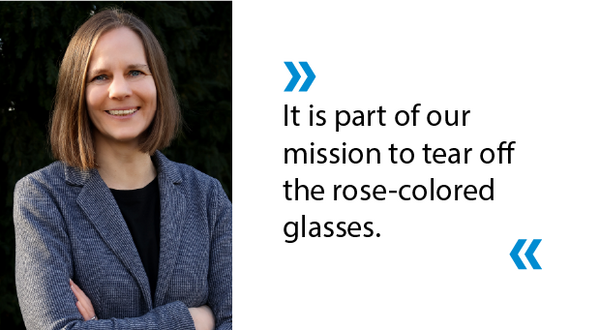PD Dr. habil. Tuuli-Marja Kleiner
Award-winning scientist with an analytical view.

What holds our society together? What are the effects of increasing polarization? Who participates in it, and who is left out? Do citizens trust their political system? Do they identify with their political community?
As a sociologist and political scientist, Tuuli-Marja Kleiner is looking for answers to precisely these questions. She conducts research on democracy, social cohesion and participation – and since her work at the Thünen Institute, with a special focus on rural areas.
What brought her to the Thünen Institute back then? The desire for better working conditions and a better work-life balance. University life was characterized by fixed-term contracts and fears about the future. She no longer wanted to accept these conditions.
Tuuli-Marja Kleiner is a scientist with all of her heart: she has always wanted to understand what holds society together at its core and why people act the way they do. The world of social interaction is like a giant puzzle for her: "Every time you understand another piece of the puzzle, it gives you a kick," she says. But the intellectual stimulus alone is not enough for her. What she finds difficult to bear are narratives that are adopted and disseminated unquestioned. She sees this as a central task of science: "It is part of our mission to compare widespread assumptions with scientific findings and, if necessary, to tear off rose-colored glasses."
Tuuli-Marja Kleiner is known for critically questioning common narratives – an attitude that does not always meet with approval and sometimes encounters headwinds. However, her habilitation at Goethe University Frankfurt, several scientific awards and her membership in seven expert committees show that her work is widely recognized in the professional world.
Tuuli-Marja Kleiner also sees potential for improvement in the situation of women in science. Gender studies show that discrimination in funding, publications and appointments continues to be a problem. But it is not only structural changes that are needed, but also more female role models: women who sit in important positions and encourage younger female scientists. Mentoring programmes are also in demand that show career paths and support young women in finding their way in the science system. This helps future generations.
For the future, Tuuli-Marja Kleiner would like to see a real awareness of discrimination that goes beyond mere lip confessions – not only towards women, but also towards socio-economically disadvantaged people, people with a migration background and people with disabilities. "It would be nice if society could recognize that inclusion is a win for everyone – not only in science, but as a whole."






